I by IMD offers first-person business intelligence from the brightest thinkers in academia, business and society. Written by experts for experts, we present a platform for debate on the latest issues in management, strategy, technology, finance, team building and innovation. Our content ecosystem is designed to spark conversation and deliver actionable insights to a broad and engaged global audience. We host conversations – via articles, comment pieces, videos and podcasts – about the latest issues in management. Whether ideas about companies or office politics, we aim to spark debate – you may not agree with everything you read here – and to deliver actionable insights to an engaged global executive audience.
We all have a stake in the future, so let's use it wisely
Friedman and the case against social responsibility: did he win after all? • Profits before all was the doctrine espoused in the 1970s, and while the look of big business in America has evolved beyond recognition, the motivations seem little changed, argues Jerry Davis
A clear vision for sustainable business transformation • Sustainable business contributes to the success of all its stakeholders and helps the next generation to enjoy a prosperous future. But, as Jean-François Manzoni and Julia Binder explain, this includes not only environmental sustainability but also social and economic inclusion. Over the following 39 pages, our experts examine how to achieve these ambitious goals.
Chicken or pig? New ESG rules require true board commitment • There is a well-known metaphor in business that illustrates levels of buy-in: imagine a chicken and a pig discussing a bacon and egg sandwich – the chicken is engaged, but the pig is committed! A similar change in buy-in level applies to the fast-changing role of ESG in the boardroom, argue Sam Gill and Jan van der Kaaij
Should you put your faith in engagement or divestment? Praise be, there is a third way • The Church of England has moved away from engagement and sold its fossil fuel shares, but to whose benefit? The shares have most likely been bought by investors who care little about climate change. One pension fund’s pioneering approach may provide a better alternative, argues Michael Skapinker
Still on the right track, the triple bottom line has renewed purpose • Focusing on a company’s ecological and social impact as well as its economic performance has yielded mixed results. However, there is increasing evidence that even legacy companies are now making positive strides. Sudhanshu Sarronwala offers advice on how all businesses can ‘do the right thing’
Responsibility, resilience, and regeneration … three Rs are the new triple bottom line • What’s a regenerative business model? It starts with designing companies as if we mean to stay on this planet, writes John Elkington
How carbon 'ranchers' could help prevent environmental disaster
Set an ambitious goal, then work backward to achieve it • Using the ‘Future Back’ tool can set your organization on the path to a successful sustainable business transformation. Knut Haanaes and Bryony Jansen-van Tuyll outline three practical steps to achieve lasting results.
8 steps to make the 'Future Back' exercise a success
How 'Future Back' works in practice
Why Amazon innovators write press releases for products that don't exist
A new legal framework is needed to cut through the sustainability jungle • With over 300 sustainability standards and labels available, it’s no wonder that so many companies get away with ‘greenwashing’. A new approach is needed to drive holistic and transparent change, write Jonathan Normand and Fabio Monnet of B Lab Switzerland
The Alliance for Sustainable Enterprises calls for Swiss law changes
A manifesto for the recognition of sustainable...
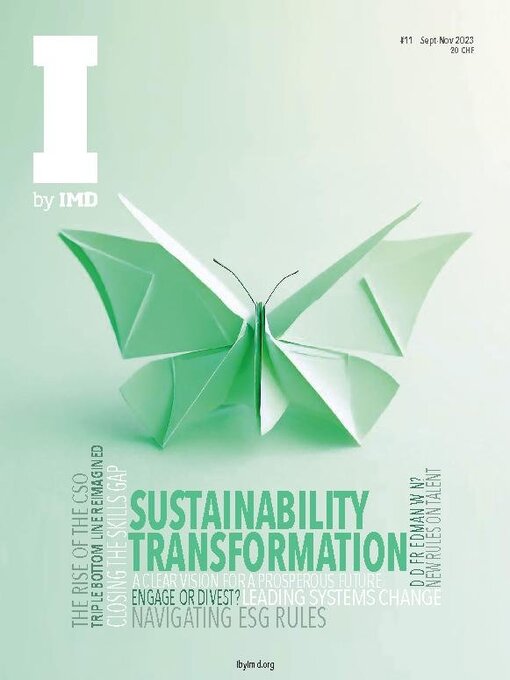
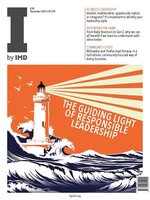 Dec 16 2024
Dec 16 2024
 15. September-November 2024
15. September-November 2024
 14. June-August 2024
14. June-August 2024
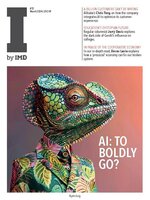 Mar 13 2024
Mar 13 2024
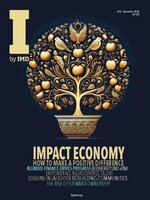 Dec 12 2023
Dec 12 2023
 Sep 11 2023
Sep 11 2023
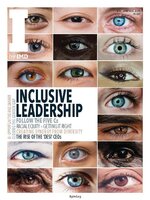 Jun 10 2023
Jun 10 2023
 Mar 09 2023
Mar 09 2023
 Apr 01 2022
Apr 01 2022
 Mar 01 2022
Mar 01 2022
 Feb 01 2022
Feb 01 2022
 Jan 01 2022
Jan 01 2022
